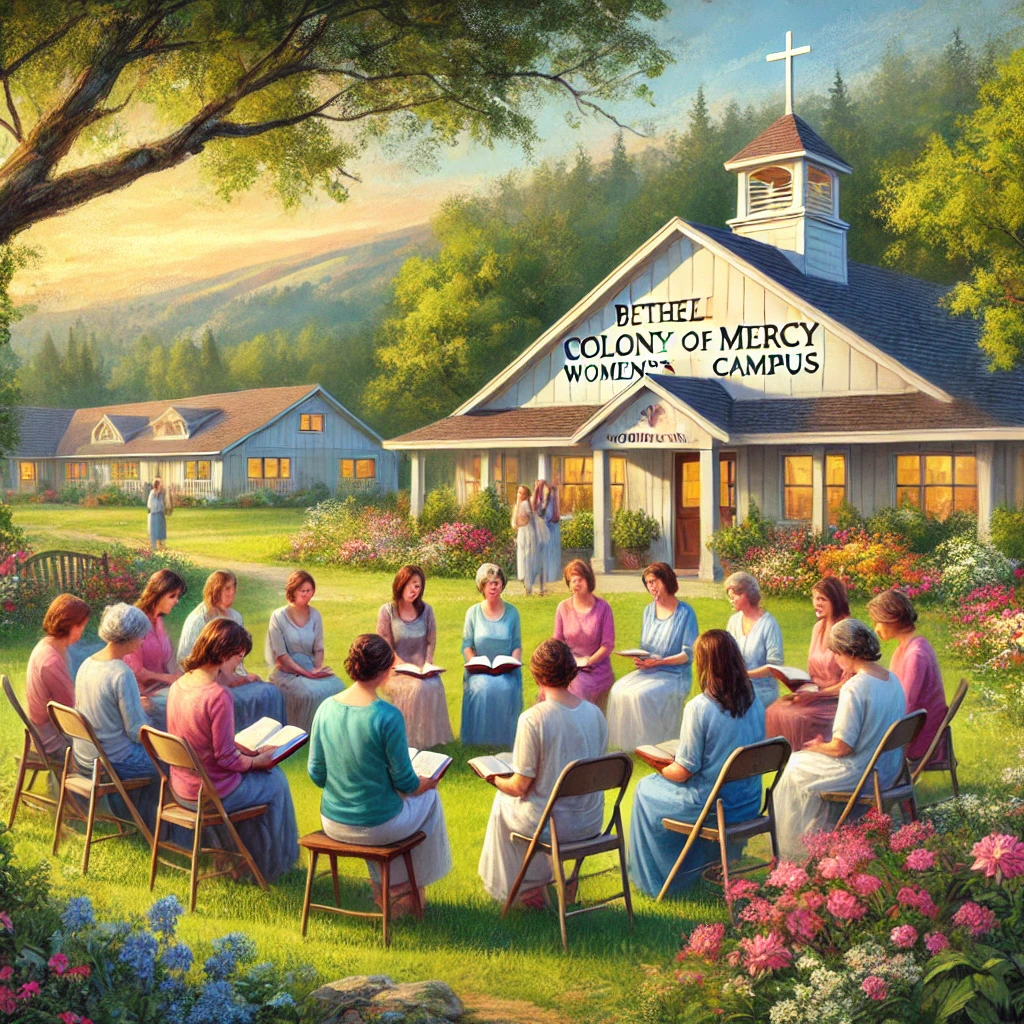
Alright, let’s start at ground level. You’ve probably stumbled across the name “Bethel Colony of Mercy” if you’re Googling places for addiction recovery with a twist of faith and a whole lot of heart. But here’s the thing—this ain’t your average rehab. And it sure as heck isn’t some cold, clinical space that just throws 12-step lingo at you and calls it a day.
No, Bethel Colony NC—tucked into the peaceful corners of Bethel, North Carolina—is a faith based substance abuse treatment center where real men are wrestling with real stuff. It’s a place where you bring your mess, your brokenness, your pain—and walk into a process that looks a lot more like transformation than treatment.
Forget what you think you know about Christian addiction treatment. This isn’t just some Sunday school with chores. It’s work, prayer, discipline, tears, cracked voices during worship, and guys learning to feel something again. Whether you’re looking for “Bethel near me” or you came across stories about Bethel Colony of Mercy reviews, you’ve landed on something different. And honestly? It works.
📍 Google Maps Location:
Bethel Colony of Mercy, Lenoir, NC
Ultimate Guide to Bethel Ridge Outdoor Activities: Explore Trails, Camping, and More
The Backstory—How Bethel Colony NC Got Here
From Humble Roots to a Healing Giant
The story of Bethel Colony begins way back in 1948. A handful of folks got serious about creating a place where addiction could be fought—not just with psychology or prescriptions, but with the raw, redemptive power of the Gospel. And guess what? That tiny flicker in the foothills of Lenoir became a full-on blaze of healing.
Today, the Bethel Colony of Mercy in Lenoir NC is a full-fledged campus helping men shake off chains they thought they’d wear forever. The roots of this mission are deep and soaked in scripture.
Hebron Colony Ministries and the Bigger Picture
Now, let’s widen the lens. Bethel didn’t rise in a vacuum. It’s actually part of a bigger family—connected to places like Hebron Colony Ministries Inc, Hebron Colony Boone NC, and more. These Christian colonies (yes, think “Christian colony”—without the weird culty vibes) have one mission: healing through Christ.
And even though Hebron Colony and Samaritan Colony Rockingham NC operate separately, their hearts beat to the same rhythm: Gospel, grace, grit.
Why the Mission Still Hits Different
Here’s what hits me hardest: Bethel’s stayed true. Even as addiction has changed—hello, colony drugs, fentanyl, meth—Bethel hasn’t tried to be trendy. They’ve just doubled down on truth.
And that’s rare.
It’s not about selling a product. They’re not pushing supplements or miracle oils. There’s no “luxury spa” garbage. It’s scripture, hard work, mentorship, and more scripture.
Things to Do in Bethel, Maine: Ultimate Guide to Exploring This Charming Mountain Town
Inside the Program: How the Healing Happens
The Structure that Replaces Chaos
First thing I noticed? Structure. It’s not bootcamp, but it’s got that feel. And that’s a good thing. Wake up early. Worship. Eat. Work. Pray. Learn. Repeat.
For a guy used to running from everything—including himself—structure is a lifeline.
Work Therapy with a Purpose
This ain’t busywork. Work therapy here is a sacred thing. You’re learning to contribute, to sweat, to feel pride again. I watched guys sand picnic tables like they were building altars. Every job is a step toward dignity.
Christ-Centered Classes & Counseling
Want to know what healing sounds like? It’s a man choking out the word “forgiveness” in front of 20 brothers. Classes here dig deep—money, anger, parenting, Christian men’s recovery programs, everything. They get messy on purpose.
And the counseling? It’s not some fresh-out-of-grad-school type. It’s real talk from people who’ve been there.
A Day in the Life at Bethel Colony Lenoir

Wake Up, Worship, and Work
Picture this: sunrise creeping through the trees, guys already praying over coffee, and worship rolling through the hills. It’s not for show. It’s just… how they start the day.
By 7 AM, they’re in group worship. After breakfast? Work therapy. Afternoon brings deep classes. Evenings chill with testimonies or mentoring. It’s packed but peaceful.
No Phones, No Noise—Just Brotherhood
Phones? Gone. Distractions? Nope. This is about being present. That means face-to-face convos, eye contact, and prayers that aren’t read off an app. Brotherhood blooms when there’s no screen to hide behind.
Faith + Sweat = Healing
Addiction strips dignity. Bethel restores it—not with slogans, but with sweat, structure, and scripture. That combo changes lives.
One resident told me, “I didn’t know what clean felt like. Now I feel clean in my soul.” That’s Bethel deliverance.
What Makes Bethel Different from Other Recovery Centers?
Real Talk from Real Men
This isn’t a place where people fake it for a bed. If you’re here, you’re serious—or you get serious quick. I met guys who’ve done time, lived under bridges, or lost everything. And now? They’re mentoring others. They’re leading prayer.
That’s what Christian Bethel is about: redemption, not perfection.
Reviews That Aren’t Fluff
Ever scroll reviews and think “no way this is real”? Not here. Bethel Colony of Mercy reviews are raw. Real dudes talking about real breakthroughs.
One said:
“Bethel didn’t just help me get clean—it taught me to be a dad, a man, a disciple.”
Not Just Sobriety—It’s Bethel Deliverance
Some rehabs talk recovery. Bethel talks transformation. This is spiritual warfare, not just behavior modification. Call it what you want—Christian alcohol recovery, faith based drug treatment centers, or even just “hope with a Bible”—but it works.
Inside the Program: How the Healing Happens
The Structure that Replaces Chaos
First thing I noticed? Structure. It’s not bootcamp, but it’s got that feel. And that’s a good thing. Wake up early. Worship. Eat. Work. Pray. Learn. Repeat.
For a guy used to running from everything—including himself—structure is a lifeline.
Work Therapy with a Purpose
This ain’t busywork. Work therapy here is a sacred thing. You’re learning to contribute, to sweat, to feel pride again. I watched guys sand picnic tables like they were building altars. Every job is a step toward dignity.
Christ-Centered Classes & Counseling
Want to know what healing sounds like? It’s a man choking out the word “forgiveness” in front of 20 brothers. Classes here dig deep—money, anger, parenting, Christian men’s recovery programs, everything. They get messy on purpose.
And the counseling? It’s not some fresh-out-of-grad-school type. It’s real talk from people who’ve been there.
A Day in the Life at Bethel Colony Lenoir
Wake Up, Worship, and Work

Picture this: sunrise creeping through the trees, guys already praying over coffee, and worship rolling through the hills. It’s not for show. It’s just… how they start the day.
By 7 AM, they’re in group worship. After breakfast? Work therapy. Afternoon brings deep classes. Evenings chill with testimonies or mentoring. It’s packed but peaceful.
No Phones, No Noise—Just Brotherhood
Phones? Gone. Distractions? Nope. This is about being present. That means face-to-face convos, eye contact, and prayers that aren’t read off an app. Brotherhood blooms when there’s no screen to hide behind.
Faith + Sweat = Healing
Addiction strips dignity. Bethel restores it—not with slogans, but with sweat, structure, and scripture. That combo changes lives.
One resident told me, “I didn’t know what clean felt like. Now I feel clean in my soul.” That’s Bethel deliverance.
What Makes Bethel Different from Other Recovery Centers?
Real Talk from Real Men
This isn’t a place where people fake it for a bed. If you’re here, you’re serious—or you get serious quick. I met guys who’ve done time, lived under bridges, or lost everything. And now? They’re mentoring others. They’re leading prayer.
That’s what Christian Bethel is about: redemption, not perfection.
Reviews That Aren’t Fluff
Ever scroll reviews and think “no way this is real”? Not here. Bethel Colony of Mercy reviews are raw. Real dudes talking about real breakthroughs.
One said:
“Bethel didn’t just help me get clean—it taught me to be a dad, a man, a disciple.”
Not Just Sobriety—It’s Bethel Deliverance
Some rehabs talk recovery. Bethel talks transformation. This is spiritual warfare, not just behavior modification. Call it what you want—Christian alcohol recovery, faith based drug treatment centers, or even just “hope with a Bible”—but it works.
What the People Say: Bethel Colony of Mercy Reviews
If you really want to know if a recovery program works, don’t ask the website—ask the people who survived it. And man, the reviews for Bethel Colony of Mercy? They’re something else.
Real Voices from the Frontlines
You won’t find sugar-coated testimonials here. Instead, you’ll hear from men who lost it all—jobs, families, even their own sense of worth—and got it back through Bethel deliverance.
“I came here broken. I left standing tall. Bethel taught me how to love again—myself, my kids, and God.”
— A guy I met during chapel
They’re husbands now. Dads again. Teachers. Mentors. That’s what Christian colony life does—it redefines you.
And the stories flood in on Bethel Colony of Mercy Facebook, Google, TripAdvisor. It’s not a PR machine. It’s dudes pouring their hearts out.
Five Stars That Actually Mean Something
Bethel’s got a near-perfect score on most platforms. But it’s not about ratings—it’s about what they represent. Peace. Purpose. Faith based substance abuse treatment that doesn’t play games.
A guy from Bethel North Carolina posted:
⭐️⭐️⭐️⭐️⭐️
“I didn’t believe in God or recovery when I got here. Now I won’t go a day without either.”
That’s not fluff—that’s transformation.
How to Apply: The Bethel Application Process

Thinking about enrolling? Or helping someone else get in? The Bethel application process is simple—but serious. This isn’t just a bed and a Bible. You’ve got to be ready.
Here’s What You’ll Need:
Be 18+ and male. (Colony women go to the sister campus.)
Download and print the application. No digital submissions.
Write a letter of intent. Be honest. Share your story. They’ll read it.
Get a sponsor—a pastor, family member, someone solid.
Mail Bethel or deliver the packet by hand. No walk-ins.
Wait for a callback and intake interview. Sometimes there’s a waitlist. Be patient—it’s worth it.
Pro Tip: Honesty Wins
Don’t try to “say the right thing.” Just be real. They’re not looking for polished. They’re looking for ready. I helped a buddy apply last year, and what got him in? His rawness.
What Happens After Bethel: The Aftercare That Actually Cares
Bethel’s not the kind of place that says, “Good luck out there,” and waves goodbye. Nope—they’ve got your back for the long haul.
Mentorship That Sticks
Graduates are matched with mentors who check in regularly. Not just “how’s sobriety?” but “how’s your soul?” That makes a difference.
Work, Housing & Church Re-entry
Through local connections—including folks at New Bethel Church Charlotte and others—graduates find jobs, housing, and church homes. This isn’t a “sink or swim” handoff—it’s a launch pad.
Why Aftercare Works Here
Bethel grads don’t just avoid relapse—they thrive. They become leaders, fathers, employees. Some even start Christian addiction groups or return as staff.
Want Christian based recovery programs near me that don’t ghost you after you leave? Bethel’s the real deal.
Planning a Visit to Bethel Colony NC
Whether you’re enrolling, visiting, or just checking it out, here’s the scoop on getting to Bethel Colony Lenoir NC.
Directions & Local Travel Tips
Closest airport: Charlotte Douglas International (~1.5 hrs)
Drive in via US-321. Look for Bethel Colony Road. It’s marked.
Best to bring printed directions—GPS works, but some areas get spotty signal.
Places to Stay (If You’re Dropping Someone Off)
Comfort Inn Lenoir
Red Roof Inn
Airbnb cabins nearby (great if you want a few quiet days)
Eat, Explore, and Unwind
If you’ve got a few hours post-intake or during family weekend:
Grab lunch at Hannah’s BBQ or Perkz Café
Take a walk at Pisgah National Forest or Wilson Creek
Visit Benfield Automotive Lenoir if you’re driving in and need a quick tune-up
And if you’re like me—stressed, anxious, emotional before check-in—trust me, the scenic drive out to Bethel NC helps. Nature does its thing.
The Women’s Program: Hope for Daughters, Mothers, Sisters

A lot of people don’t know this, but Bethel Colony of Mercy has a whole colony women program now—and it’s just as powerful.
A Safe Place for Women to Heal
It’s not just a copy-paste of the men’s campus. This place is built for women, by women. Staff are survivors. Counselors are Christ-filled. And the structure? It’s tough but kind.
What’s Different for the Ladies?
Trauma recovery specific to women
Motherhood and parenting sessions
Leadership training and faith mentorship
A space free from judgment, full of grace
Bethel House Waynesville NC: Another Option
If you’re looking for alternatives nearby, Bethel House in Waynesville and Bethany Recovery Center offer similar faith-based drug treatment centers for women. All rooted in the same mission: Jesus + accountability = freedom.
Beyond Recovery: Bethel Merchandise, Books, and More
Once you’ve been through something as life-altering as the Bethel Colony of Mercy transformation, you kind of want to carry a piece of it with you. That’s where the Bethel “extras” come in—not just keepsakes, but tools for continued growth.
Bethel Merchandise That Means Something
Whether it’s a hoodie, cap, journal, or even a prayer card, Bethel’s gear does more than look good—it starts conversations. Wearing Bethel merchandise is like a silent testimony. You’re saying, “I’ve seen change. I’ve lived it.”
You can buy from the campus store or sometimes online (through updates in the Bethel newsletter). It’s one of the few rehab centers I’ve seen where merch feels more like ministry than marketing.
The Bethel Bookstore & Devotionals
The on-campus Bethel bookstore is full of Bethel books, recovery guides, devotionals, and study material. From scripture deep-dives to real-life testimonies in print, this place is a goldmine. Many grads take these books home to continue their walk—or gift them to others still struggling.
Bethel Ridge Community and Weather: A Complete Travel Guide
Bethel’s Extended Family: Other Programs and Partners

Bethel doesn’t work alone. The kingdom is big, and Bethel’s connected to it. If you’re considering alternatives or looking to refer someone outside North Carolina, here are some Christian recovery programs near me you might explore.
Trusted Allies in Recovery
| Organization | Location | Notes |
|---|---|---|
| Hebron Colony Ministries Boone NC | Boone, NC | Same roots, solid curriculum |
| Samaritan Colony NC | Rockingham, NC | Strong in male addiction care |
| Bethany Recovery Center | Various NC cities | Women’s faith-based recovery |
| New Bethel Church of God in Christ Charlotte NC | Charlotte, NC | Great outreach/support groups |
Across State Lines: Bethel Colony in New Orleans
While not directly connected, Bethel Colony New Orleans (or Bethel Colony Louisiana) shares a spiritual kinship. Faith-centered, structured, and focused on Christian alcohol recovery, it’s worth a look if you’re in the Gulf region.
Christian Recovery Homes Nationwide
Use phrases like “Christian men’s recovery programs” or “Christian based recovery programs near me” to find more. From urban centers to rural towns, these colonies (like man colony, picture colony, or even a picture of a colony style setups) are often hidden gems.
Deep Dive: Alumni Stories That Stay With You
When I visited Bethel Colony of Mercy, I didn’t expect to get hit in the gut with people’s honesty. These weren’t rehearsed testimonials—they were raw. Messy. Honest.
One man I spoke with—let’s call him David—had spent 14 years on and off meth, bouncing between jail, shelters, and total isolation. He found Bethel after Googling “Christian based recovery programs near me,” filled out the Bethel application, and never looked back.
“I didn’t know who I was anymore. I was just the guy who always relapsed. Bethel didn’t just teach me how to be sober. They taught me how to belong again.”
Now, David is back at Bethel—only this time as a mentor. That’s the Bethel way. Redemption isn’t just internal—it becomes communal. It becomes colony family.
Another story came from a graduate named Chris, who now runs Christian addiction groups out of his home church in Bethel NC. Chris had battled alcohol for decades before finding the Bethel rehabilitation center through Bethel Colony of Mercy Facebook.
“This place saved my marriage. My kids talk to me again. I’m alive—literally and spiritually.”
Their stories aren’t rare here. They’re the norm. Whether you’re from Charlotte, Boone, or even Bethel New Orleans Louisiana, the ripple effect is massive.
Spiritual and Emotional Transformation: The Real Win

Let’s be real—plenty of programs can get you sober. But not many teach you how to stay that way spiritually, emotionally, and relationally.
Faith based drug treatment centers like Bethel operate on the belief that sobriety isn’t just about quitting substances. It’s about rediscovering who you are in Christ.
Residents learn:
Emotional regulation through scripture-based lessons
Spiritual authority through daily devotionals and prayer
Forgiveness and release from shame, often for the first time
One class I sat in talked about “replacing the lie.” The counselor—a Bethel grad himself—walked through how addiction is rooted in spiritual lies: “I’m not good enough,” “I can’t change,” “God’s done with me.”
He said something I’ll never forget:
“When the truth of Christ moves into your soul, addiction has no more room.”
That’s the core of Bethel deliverance—freedom that sticks.
Financial & Community Impact of Bethel Colony
Let’s zoom out a bit.
18.1 Affordable, Donation-Based Healing
Unlike luxury rehabs charging $30K/month, Bethel is sustained through donations and ministry partnerships. Alumni, churches, and even local businesses like Benfield Automotive Lenoir often chip in to keep costs low. This makes it one of the most affordable faith based drug rehabs in the Southeast.
18.2 Job Creation and Local Partnerships
Bethel doesn’t just help individuals—it helps Lenoir. From hiring staff to partnering with Christian recovery homes, Bethel stimulates local commerce while also being a beacon of hope.
Several local churches, like New Bethel Church Charlotte, collaborate to offer re-entry housing, worship nights, and long-term mentorship for graduates.
For every person Bethel helps, the ripple touches families, workplaces, courts, and communities. Crime rates go down. Job placements go up. People reenter society stronger—and more compassionate.
⚖️ 19. How Bethel Compares to Other Rehab Models
Here’s a simple side-by-side comparison:
| Feature | Bethel Colony | Traditional Rehab | Luxury Rehab |
|---|---|---|---|
| Faith-Based | ✅ | ❌ | Sometimes |
| Work Therapy | ✅ | ❌ | ❌ |
| Peer Mentorship | ✅ | ❌ | ✅ |
| Affordable Cost | ✅ | ✅ (with insurance) | ❌ |
| Aftercare Network | ✅ | ✅ | ❌ |
| Spiritual Freedom | ✅ | ❌ | ❌ |
Whether you’re comparing to Samaritan Colony, Hebron Colony, or secular programs like Bethany Recovery Center, Bethel stands out because it doesn’t just “treat”—it transforms.
Things to Do in Bethel, Maine: Ultimate Guide to Exploring This Charming Mountain Town
Downloadable Travel Itinerary and Packing Checklist (Free PDF)
To make your visit or check-in process smoother, I’ve created a simple Downloadable Travel Itinerary & Packing List for Bethel Colony of Mercy. Whether you’re enrolling, visiting, or helping someone transition into the program, this checklist will help you feel prepared.
🧳 Download Here: PDF Travel Itinerary & Packing List (Add your actual link here)
What’s Inside the Free Download:
Travel Plan Checklist:
Departure date and time
Local hotel suggestions for overnight stays
Maps and directions from major cities
Important contact numbers
Packing List:
Personal hygiene items (soap, toothbrush, razor, etc.)
Modest, weather-appropriate clothing
Bible and notebook
Towels, bedding, and pillow
Work gloves and boots for job assignments
Laundry detergent
Prescription medications (approved only)
Identification and insurance documents
Prohibited Items:
Electronics (phones, laptops, etc.)
Secular books and magazines
Outside food or drinks
Tobacco, alcohol, drugs (even OTC unless approved)
From my own experience helping a friend enroll, being prepared made the entire process smoother and much less stressful. Print this list or download it to your phone before your trip.
✅ 20. Final Wrap-Up: Choosing Faith Over Fear
So why choose Bethel Colony of Mercy?
Because it’s not just about getting clean—it’s about being set free. From the chains of addiction, sure. But also from shame. From bitterness. From the spiritual fog that addiction breeds.
Whether you came across this article searching “Christian recovery programs near me,” stumbled into a Bethel newsletter, or found a picture colony on social media that sparked your interest—this is your sign.
Take the step. Fill out the Bethel application. Ask for help. Choose hope.
❓ Frequently Asked Questions
A1: Bring your Bible, work clothes, bedding, hygiene items. Leave electronics, secular music, and pride at the door.
A2: Yes. Many residents are referred via the legal system and Bethel provides documentation and progress reports.
A3: Yes! They have scheduled family days where loved ones can visit, attend worship, and support their progress.
A4: Nope. You just have to be willing to engage in faith based drug rehabilitation. Many residents start with no faith at all—and leave forever changed.
A5: Absolutely. Whether you mail Bethel, purchase from the Bethel bookstore, or sponsor a student—every dollar helps.